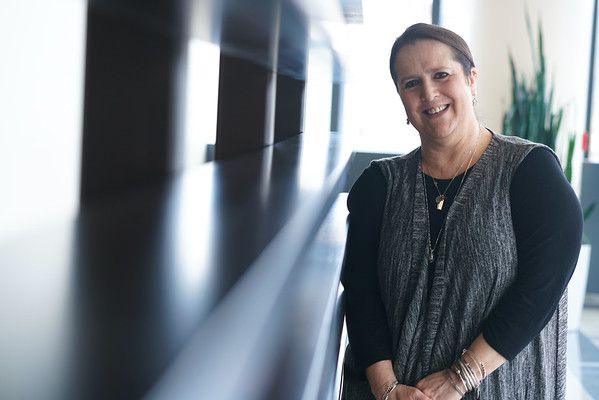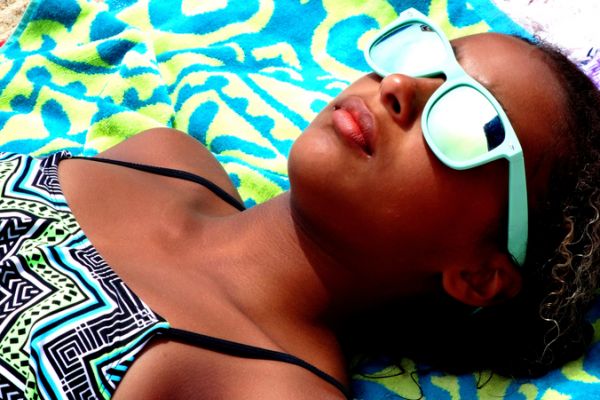I have been battling cancer successfully for 11 years. Looking back at my first diagnosis — stage 2 breast cancer, at age 42 — I downplay it now, because what happened next was so tragic.
I have no family history of melanoma. But I am an Ashkenazi Jew (someone whose Jewish ancestors came from Central or Eastern Europe), and people in this group more commonly carry a genetic change that is associated with a higher-than-average risk for developing breast, ovarian, prostate, pancreatic and colorectal cancers — and melanoma. Although scientists have identified some of the genes that contribute to the risk of melanoma, the significance of changes in those genes may not yet be clear. And most melanomas are not caused by those inherited genetic changes.
So in the fall of 2010 when my husband, David, first noticed a spot on my back, I thought it was a mosquito bite. It was itchy, and in a spot I couldn’t reach, so I asked him to scratch it for me. He said, “That’s not a mosquito bite. You need to have that checked.” He was right. At first it was a clear mole or bump, but in a short time it turned jet black.
I went to a dermatologist (not someone from Roswell Park) and he performed a punch biopsy. After an agonizing two-week wait for the results, I got the news in a phone call from a nurse: “You have melanoma. It’s just superficial.”
The dermatologist arranged for someone else in his practice — a general surgeon, not a cancer specialist — to perform the surgery at a local hospital. I wound up with a nine-inch incision in my back, but the surgeon reassured me that all the cancer had been removed — everything was gone. At that time I didn’t know much about the disease, so I breathed a sigh of relief and went on my merry way. I continued to see the dermatologist every three months for follow-up exams.
The following summer, after waking up from a nap, I tried to say something to my younger daughter, Alanna, but I couldn’t get my words out. Alanna said, “Your blood sugar must be low. You’re not making any sense.” I have type 1 diabetes, and low blood sugar can cause slurred or confused speech. But my blood sugar wasn’t low, and when my arm suddenly curled up and froze, I was really scared. I saw my primary care physician, who told me to go straight to the emergency room.
“I’m sorry, Mrs. Sade,” the ER physician told me after a CT scan. “You have a hemorrhaging brain tumor.”
I was stunned. “What? You must be wrong.”
That’s how I came to Roswell Park at last.
Never miss another Cancer Talk blog!
Sign up to receive our monthly Cancer Talk e-newsletter.
Sign up!Devastating News — and a Ray of Hope
The tumor in my brain did not start out in my brain. It had spread, or metastasized, from somewhere else in my body. Did it come from the breast cancer or the melanoma? Eventually, testing would show that it came from the melanoma.
Destroying the tumor in my brain was the first priority. The day after my visit to the ER, I underwent Gamma Knife radiosurgery at Roswell Park. I got through the treatment with no trouble, but the effects of radiosurgery are not immediate — it shrinks the tumor over a period of time, and unfortunately, the tumor was located in the part of my brain that controls speech and movement. I couldn’t walk, I couldn’t get my words out when I tried to speak, and my right hand was useless. I couldn’t even get off the couch. PET scans revealed that I had hundreds of tumors in my body, from my feet to my head. The disease had spread like wildfire.
One of my sisters died of ovarian cancer two years after my breast cancer diagnosis. Now I decided that even though it would be painful to hear, I needed to know how much time I had left. Our daughter Alanna was still in high school, and our older daughter, Emma, was in college. I needed to get my ducks in a row. It fell to Karen Vona, the nurse practitioner in the Melanoma Clinic, to explain to me that people who have melanoma at this stage live for an average of 10 to 12 months. I love and adore Karen, and I can imagine how hard it must have been for her to give me that information.
But shortly after hearing that devastating news, there was a ray of hope — an unexpected chance to try an immunotherapy that had just been approved by the FDA. My Roswell Park doctor at the time, Nikhil Khushalani, told me about Yervoy® (generic name ipilimumab — try pronouncing that!) and said it could rev up my immune system to fight the cancer. Well, I’m a fighter, and that sounded like the perfect medication for me.
I often think of what Dr. Khushalani told me: “We’re going to treat this like a chronic medical condition. As long as you’re willing to fight, we’re not counting you out.”
I couldn’t start Yervoy® right way, because they needed to “step down” the steroids I was taking to reduce brain swelling. During that time, the brain tumor grew and became more dangerous. Dr. Andrew Fabiano, a Roswell Park neurosurgeon, performed the surgery to remove it.
When I woke up in the ICU, I could talk for the first time in months. I did have to learn to walk again, but I was lucky to have Seiji Ohtake, my physical therapist, cheering me on as I walked up and down the stairs in my fuzzy pink bathrobe.
In early 2012, I began the first of four infusions of Yervoy®, which I received every three weeks. The tumors melted away, and I didn’t experience a single side effect.
In February of 2014, a PET scan indicated a possible recurrence, so I received three more infusions of Yervoy®. I am now cancer-free. Yervoy® saved my life. So far, so good.
Five Things to Think About
I’ve learned a lot during this experience. Here are just a few thoughts and words of advice for other patients.
I thought I would have to go to a big-city institution to get the latest and best treatment.
So, shortly after coming to Roswell Park, I called major cancer centers in the Eastern U.S. — Dana Farber, Sloan Kettering and Johns Hopkins. My bags were packed and I was ready to go at a moment’s notice. I explained my situation and asked them what they could offer me. When they found out I live in the Buffalo area, they asked, “Why aren’t you going to Roswell? They’re doing the same things we are. We’re all part of a consortium.* Ipilimumab has just been approved, and you can get it there. It’s an amazing place.” I am so appreciative of that advice.
You need to have hope and have faith in your doctors, but also speak your mind and ask questions.
Keep a notebook handy all the time and write down new questions as you think of them. Take the notebook with you when you go to your appointments, because you’ll never remember all those questions when you’re in the exam room.
Everybody needs a reason to keep going.
I needed to survive for my children. I wanted to see Alanna graduate from high school and Emma graduate from college. I wanted to see Alanna’s last performance dancing in The Nutcracker — and I did. They’re the main reason I never gave up. I believe everybody has a reason to fight, whether it’s a child or a job or their spouse or their siblings.
Have a sense of humor.
Every time Seiji came in to do my physical therapy, he’d say, “Oh, my favorite patient!”, and I’d laugh. Laugh! That needs to be your mantra.
Get a second opinion, and do your homework to learn about your disease.
My only regret is that I didn’t come to Roswell first.
Today I work part time as a coordinator in the Resource Center for Patients and Families at Roswell Park. I also volunteer with Roswell Park's pet therapy program on Thursdays. I love helping cancer patients, so this is where I come. I remember everything I’ve been through, but I don’t dwell on it. I really want this hospital to be my happy place.
I am well aware that I’m a cancer survivor and that the cancer can recur at any time, but it’s not the death sentence it was five years ago. I’m a success story, and I’m sticking to that.
Sara Sade is a Coordinator in Roswell Park's Resource Center for Patients and Families, where she is responsible for chemotherapy orientations, wig fittings, the Cancer Coach program and Patient and Family Support services. She also volunteers with the pet therapy program.
*Roswell Park is one of only 49 centers in the nation— and the only one in Western New York — to be designated a Comprehensive Cancer Center by the National Cancer Institute. Other members of this elite consortium include M.D. Anderson, Dana Farber, Memorial Sloan Kettering and the Mayo Clinic.
Editor’s Note: Cancer patient outcomes and experiences may vary, even for those with the same type of cancer. An individual patient’s story should not be used as a prediction of how another patient will respond to treatment. Roswell Park is transparent about the survival rates of our patients as compared to national standards, and provides this information, when available, within the cancer type sections of this website.


